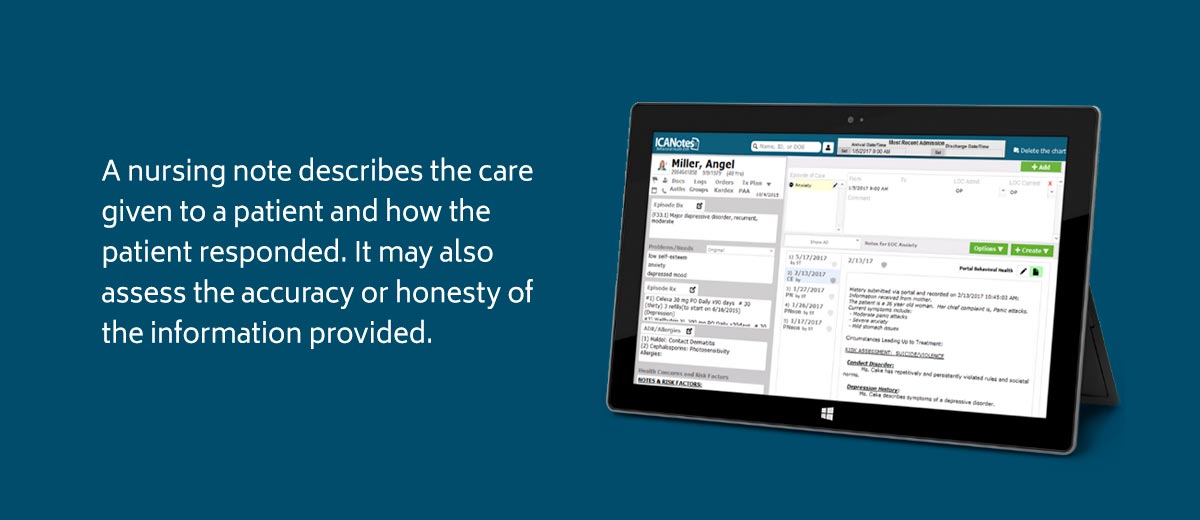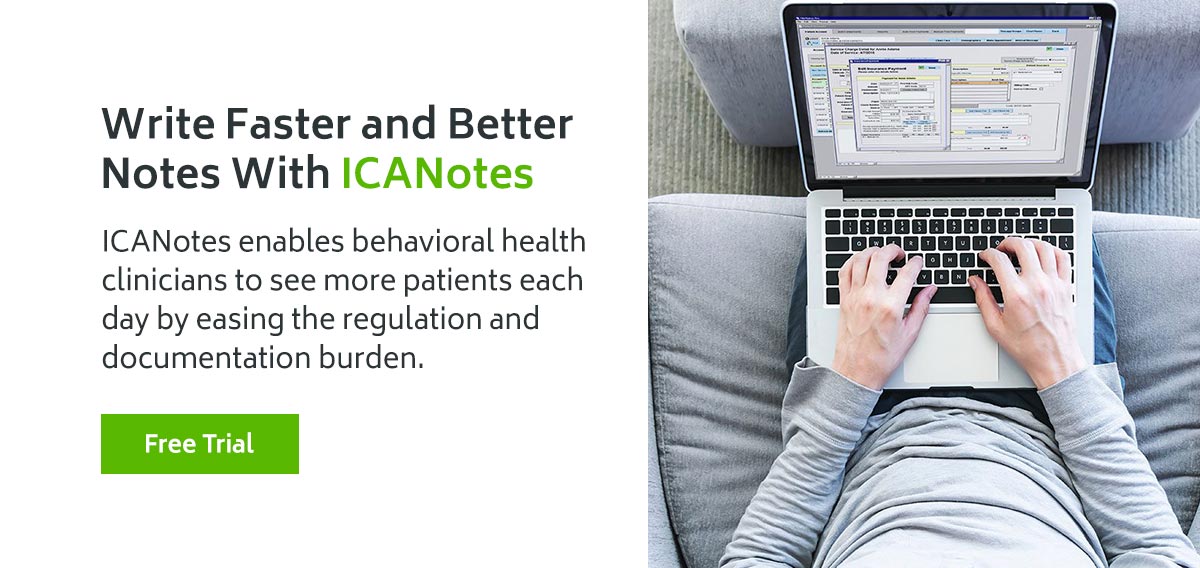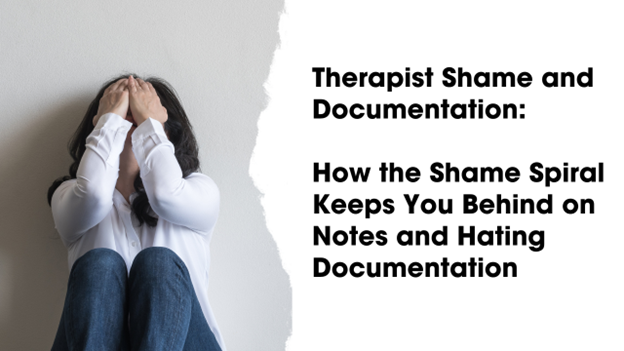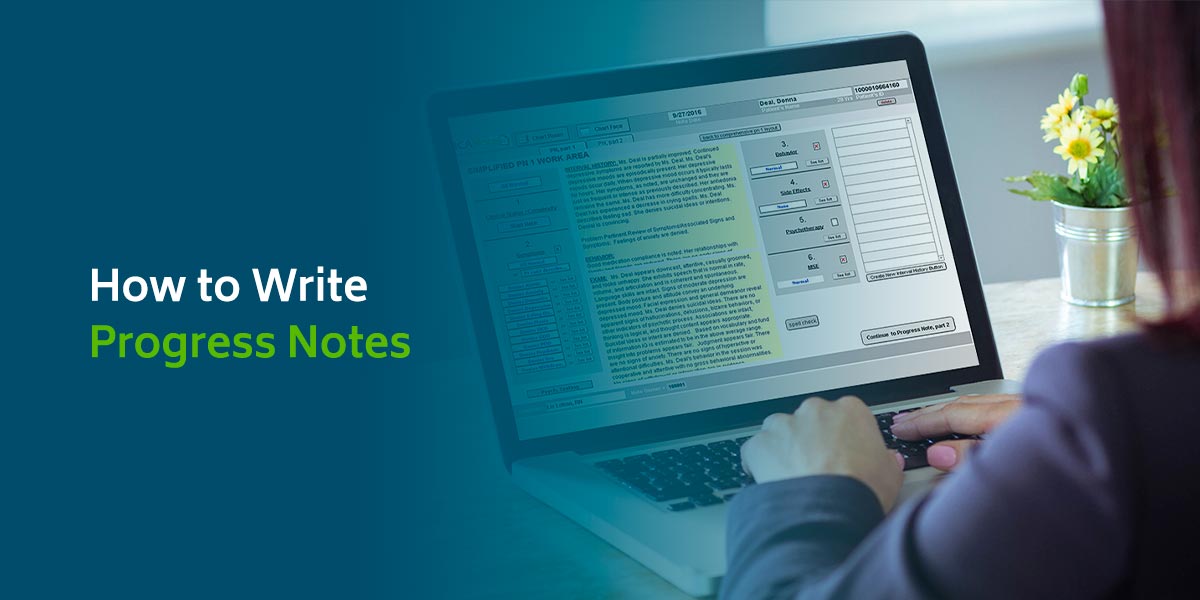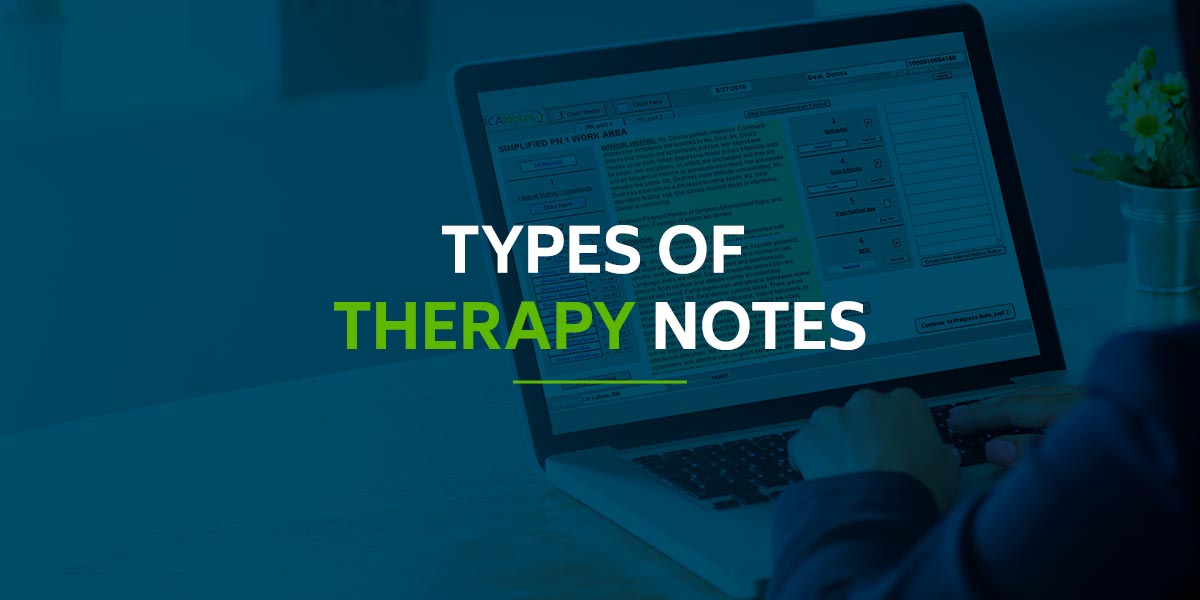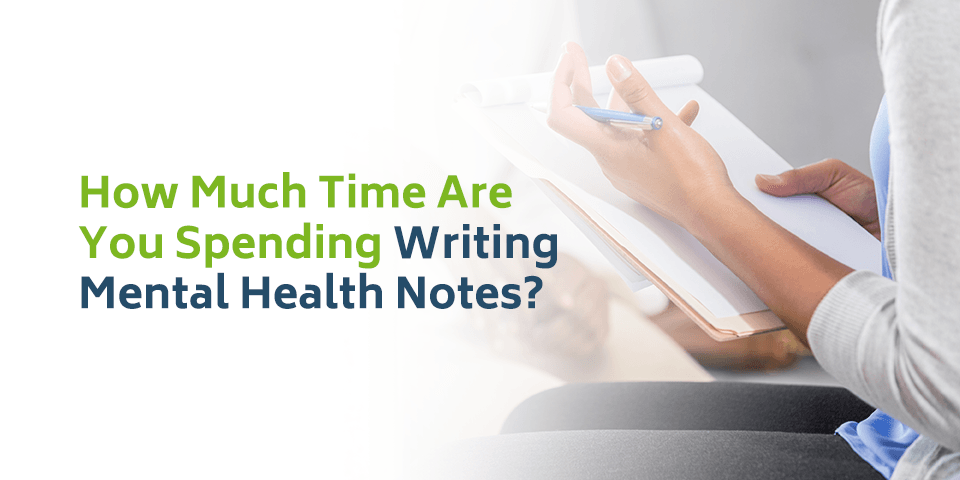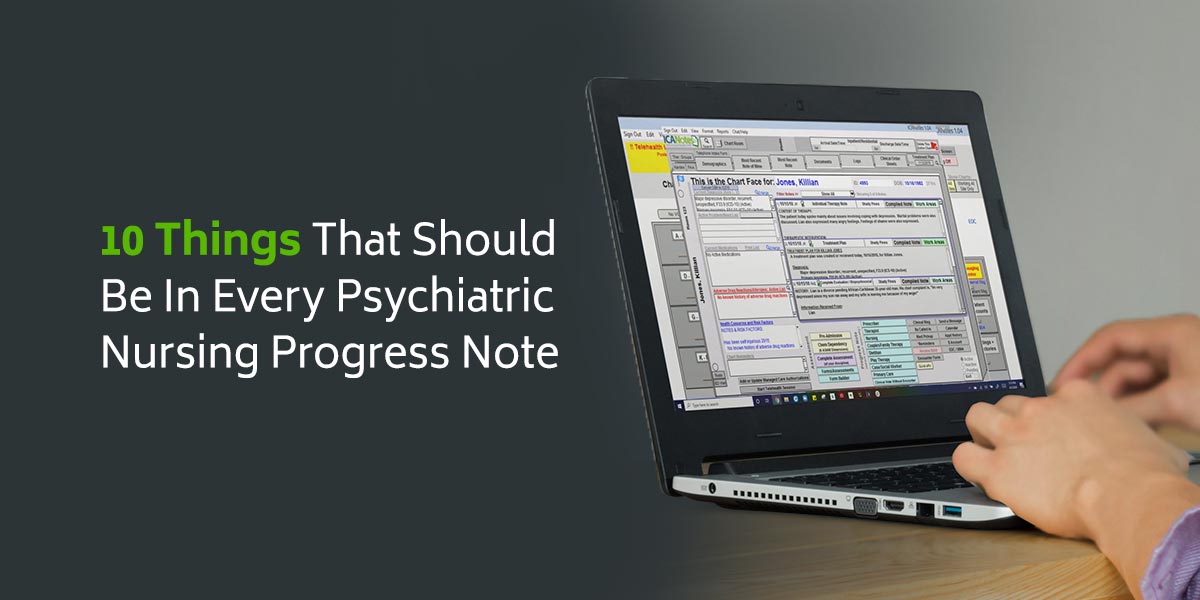
10 Things That Should Be In
Psychiatric Nursing Notes
Inpatient psychiatric nurses play a vital role as information collectors, so psychiatrists can make the right medication decisions. Psychiatric nursing notes also promote smooth communication between other healthcare providers and staff members and help prove the medical necessity of a patient's treatment. If you're wondering how to write mental health nursing notes, we hope to help you with this post. We'll share 10 critical components to include in psychiatric nurses notes, so you and other clinicians can provide high-quality care and get reimbursed by insurers.
Writing Better, Writing Faster
Get instant access to our guide to writing efficient clinical notes for psych nurses.
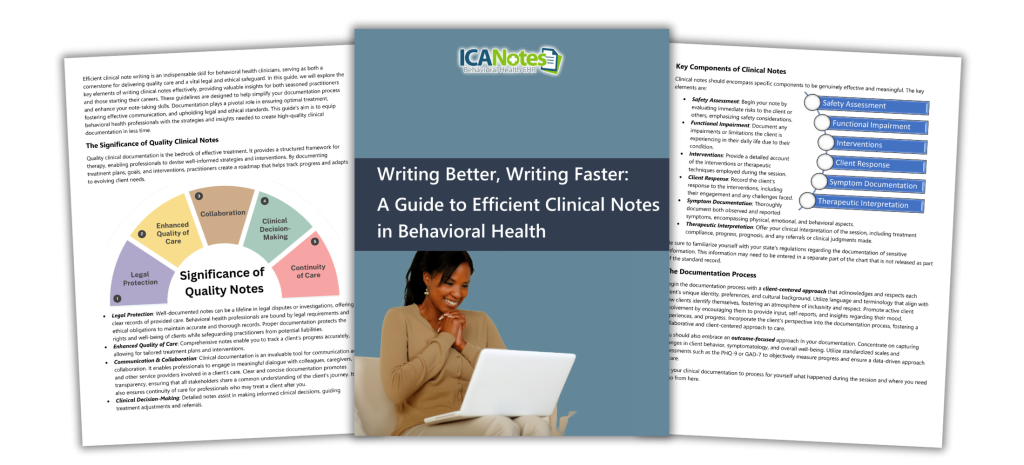
What Do Psychiatric Nursing Notes Look Like?
Overall, a psychiatric nursing note describes the care given to a patient and how they responded. Psychiatric nurses should use a standard format and write accurately, clearly, and comprehensively. As an example, a psychiatric note template might include the following fields:
- Patient's name and identification number
- Admission date
- Organization's name
- Patient's date of birth, age, and gender
- Patient's current mental status
- Whether the patient takes medication as prescribed
- Medication side effects or allergic reactions
- Any changes in medical status
- Nursing intervention delivered
- Goals addressed during the intervention
- Patient's response to the intervention
- Lab tests ordered
- Vital signs
- Diagnosis
- Newly prescribed medications
- Reasons for medication changes, if any
- Date and signature
Psychiatric Nursing Note Must-Haves
While progress notes should be as thorough as possible, you should only include relevant information and be concise. Here are 10 pieces of essential health information psychiatrists would like to read in a psych nurse's note. These details should appear in at least one nursing progress note per shift.
1. Patient Overview
How is the patient doing overall? Are they feeling better, the same, or worse? Has the patient experienced any significant issues or changes with their social relationships or current situation? Does their medication seem to be working? Take note of any progress the patient has made or if they've backtracked.
2. Symptom Status
Note the status of the patient's target symptoms. Target symptoms are those that the psychiatrist monitors to determine treatment efficacy. Are the symptoms still present? Have they gotten better or worse, and why? Record any changes or new problems the patient is experiencing.
3. Behaviors
Include information about a patient's behaviors during your shift, such as participation in activities, adherence to rules, medication compliance, and appetite. Note any disruptive or aggressive behaviors. The patient's actions provide the psychiatrist with clues about their mental status and progress.
4. Medication Side Effects
Is the patient experiencing possible medication side effects? These include symptoms the drug may not list as side effects, such as dizziness, increased thirst, or drowsiness. Asking about medication side effects is vital because it warns the psychiatrist of potentially severe issues.
5. Mental Status Examination
A mental status exam is one of the essential assessment tools that allow nurses to use their observation skills. The point of an MSE is to highlight the patient's current mental state and progress, so psychiatrists and other healthcare providers can make informed decisions. You may not need to include a complete MSE, but you should touch on a few essential areas. Ask yourself the following:
- Is the patient anxious?
- What is the patient's appearance?
- Are there signs of psychotic thought processes?
- How would you describe the patient's mood?
It's crucial to document any significant changes in the patient's mental state and potential risks.
6. Special Circumstances
Some patients require unique documentation. For example, patients in restraints or seclusion have specific documentation requirements because either of these interventions is a health risk for the patient. They could also lead to legal consequences if misused. Seclusion or restraint documentation typically includes:
- The behaviors or circumstances that led to restraint use or seclusion
- Patient's actions during the seclusion or restraint process
- Interventions provided to the patient
- List of staff members involved in the seclusion or restraint intervention
- Physical injury assessment
Other patients have some medical needs that require reevaluation. For example, patients who feel unsteady when walking or standing would need a fall risk assessment.
7. Vital Signs
How often you need to obtain vital signs depends on your facility's policy. These may include:
- Blood pressure
- Pulse
- Temperature
- Respiration
You might also document visual acuity and the patient's height, weight, and body mass index.
8. Nursing Interventions
Nursing interventions are part of a patient's treatment plan. Note the interventions you provided and how the patient responded. For instance, did you administer drugs and monitor the effects? If so, make sure to document the patient's compliance and response to the medication. If a therapeutic interaction occurred, consider if the patient was engaged and progressing toward objectives and goals. Note their overall response to the therapeutic intervention.
9. Level of Care
You can recommend the patient's level of care, such as continued hospitalization or outpatient treatment. Your psychiatric nursing documentation should prove the suggested treatment's medical necessity. Your patient's insurance provider will want proof that the client requires inpatient or outpatient care, and your notes will help your facility prepare for a treatment review.
10. Link to Treatment Plan
Most progress notes should link to a treatment plan. In your documentation, identify the objectives from the patient's treatment plan that you addressed. As stated above, including the intervention used to achieve goals and how the patient responded.
Download Sample Psychiatric Nursing Notes
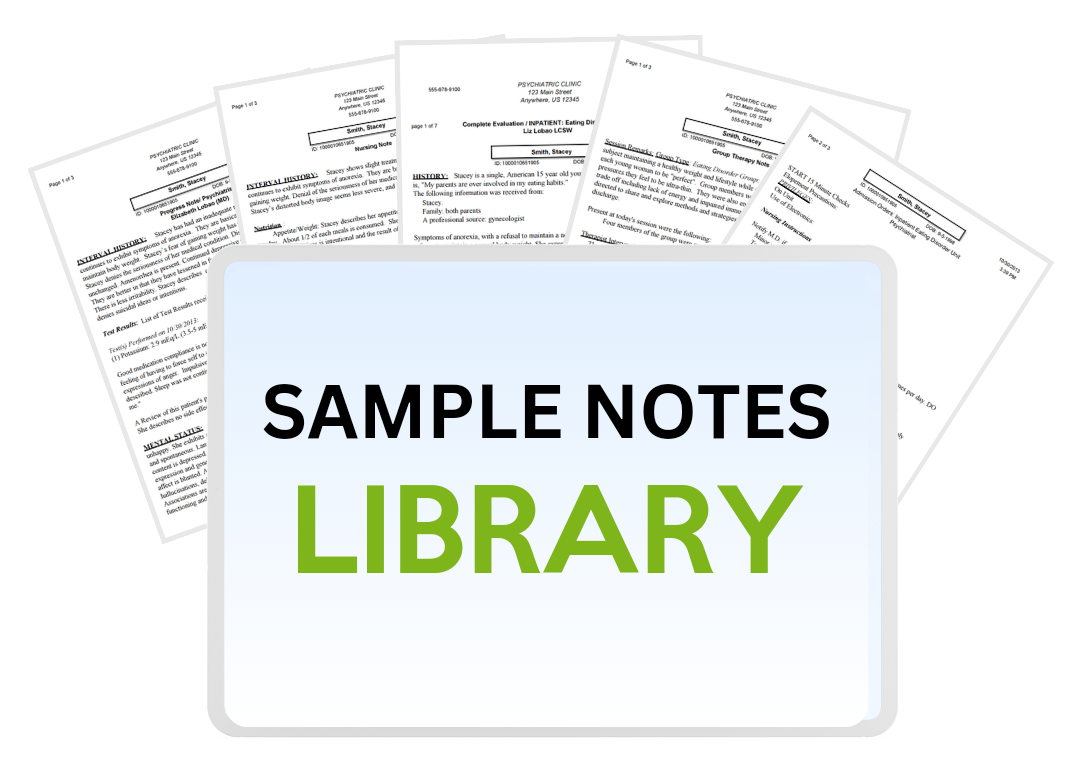
Tips for Writing Psychiatric Nursing Notes
Here are a few tips to help you create well-written progress notes:
- Ensure your notes begin with identifying information, such as the patient's name, age and birthdate.
- Avoid jargon and abbreviations.
- Write in short, clear, and complete sentences.
- Do not copy and paste information from other documents into your notes.
- Remember, your patient may want to read their progress notes, so it's critical to write accurate documentation and avoid offensive or judgmental language.
ICANotes is specialized electronic health record software designed for the behavioral health field. ICANotes enable behavioral health clinicians to see more patients each day by easing the regulation and documentation burden. As a result, clinicians can focus on the reason they got into practice in the first place: to care for their patient's mental health. Watch this video demonstration to see how to create a psychiatric nursing note in ICANotes.
Free Trial
Write Faster and Better Notes with ICANotes

